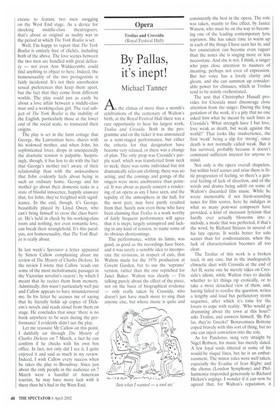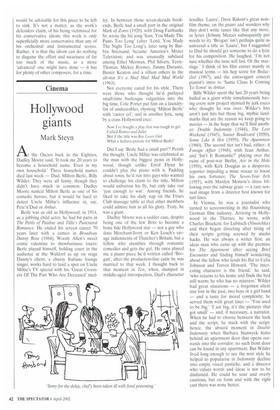Troilus and Cressida (Royal Festival Hall)
By Pallas, it's inept!
Michael Tanner
As the climax of more than a month's celebrations of the centenary of Walton's birth, at the Royal Festival Hall there was a rare opportunity to hear his largest work, Troilus and Cressida. Both in the programme and on the ticket it was announced as a semi-staged performance, but either the criteria for that designation have become very relaxed, or there was a change of plan. The only prop was Cressida's purple scarf, which was transferred from neck to neck; there was some individual but not dramatically relevant clothing; there was no acting, and the comings and goings of the singers were more unobtrusive than pointed. It was about as purely concert a rendering of an opera as any I have seen, and the tepidity of the atmosphere in the hall, for the most part, may have partly resulted from that, Surely now even those who have been claiming that Troilus is a work worthy of fairly frequent performance will agree that it is inept, largely uninspired and lacking in any kind of tension, to name some of its obvious shortcomings.
The performance, within its limits, was good, as good as the recordings have been, and it was surely a sensible idea to incorporate the revisions, in respect of cuts, that Walton made for the 1976 production at Covent Garden, but to use the 'soprano' version, rather than the one repitched for Janet Baker. Walton was clearly — I'm talking purely about the effect of the piece, not on the basis of biographical evidence — only really taken by Cressida, who doesn't just have much more to sing than anyone else, but whose music is quite and consistently the best in the opera. The role was taken, mainly to fine effect, by Janice Watson, who must be on the way to becoming one of the leading contemporary lyric sopranos. She has taken time to warm up in each of the things I have seen her in, and her enunciation can become even vaguer than the notes she is singing more or less necessitate. And she is not, I think, a singer who pays close attention to nuances of meaning, perhaps not even of expression. But her voice has a lovely clarity and gleam, and she can summon up considerable power for climaxes, which in Troilus tend to be noisily orchestrated.
The text that Christopher Hassall provides for Cressida must discourage close attention from the singer. During the long gestation of the work, it's a pity that no one asked him what he meant by such lines as Cressida's 'What strength have I but love, love weak as death, but weak against the world?' That looks like inadvertence, the first 'weak' being a slip for 'strong', since death is not normally called weak. But it has survived, probably because it doesn't command sufficient interest for anyone to mind.
Not only is the opera overall shapeless, but within brief scenes and arias there is little progression of feeling, so there's a general feeling of lack of direction, and of the words and drama being adrift on some of Walton's discarded film music. While he wrote memorable if not fresh-sounding tunes for film scores, here he indulges in what so many post-war composers have provided, a kind of incessant lyricism that hardly ever actually blossoms into a melody, a mode that was perfected, if that's the word, by Richard Strauss in several of his late operas. It works better for solo scenes than for confrontations, when the lack of characterisation becomes all too clear.
The Troilus of this work is a broken reed, in any case, but in the inadequately climactic duet with Cressida at the end of Act II, scene one he merely takes on Cressida's idiom, while Walton tries to decide whether to let things rip erotically, or to take a more detached view of them, and, having failed to resolve the question, writes a lengthy and loud but perfunctory storm sequence, after which it's time for the lovers to cope with reality. 'Who would go drumming about the town at this hour?' asks Troilus, and answers himself, 'By Pallas, they're Greeks!' Bonaventura Bottone coped bravely with this sort of thing, but no one can inject conviction into the role.
As for Pandarus, sung very straight by Nigel Robson, his music has merely dated. A few loyal souls tittered at some of his would-be risque lines, but he is an embarrassment. The minor roles were well taken, especially the Evadne of Jean Rigby; and the chorus (London Symphony) and Philharmonia responded generously to Richard Hickox's urgings. I wonder if it can now be agreed that, for Walton's reputation, it would be advisable for this piece to be left to sink. It's not a matter, as the work's defenders claim, of his being victimised for his conservative idiom; this work is only superficially more conservative than any of his orchestral and instrumental scores. Rather, it is that the idiom can do nothing to disguise the effort and weariness of far too much of the music, as a more 'advanced' one might have done — it has for plenty of other composers, for a time.































































 Previous page
Previous page